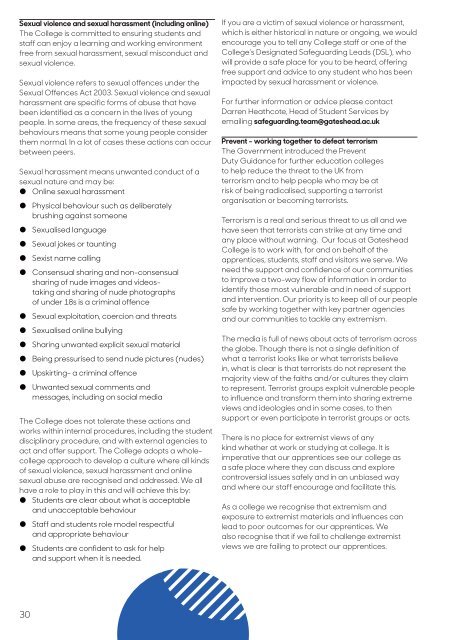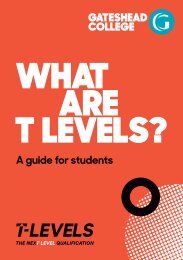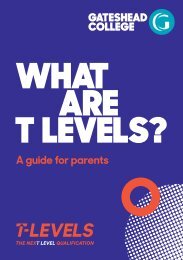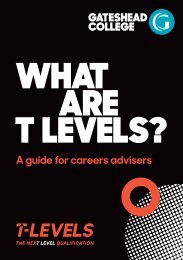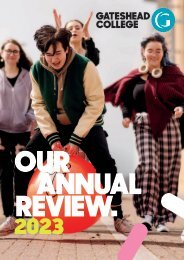Apprenticeship Handbook 2023/24
Create successful ePaper yourself
Turn your PDF publications into a flip-book with our unique Google optimized e-Paper software.
Sexual violence and sexual harassment (including online)<br />
The College is committed to ensuring students and<br />
staff can enjoy a learning and working environment<br />
free from sexual harassment, sexual misconduct and<br />
sexual violence.<br />
Sexual violence refers to sexual offences under the<br />
Sexual Offences Act 2003. Sexual violence and sexual<br />
harassment are specific forms of abuse that have<br />
been identified as a concern in the lives of young<br />
people. In some areas, the frequency of these sexual<br />
behaviours means that some young people consider<br />
them normal. In a lot of cases these actions can occur<br />
between peers.<br />
Sexual harassment means unwanted conduct of a<br />
sexual nature and may be:<br />
● Online sexual harassment<br />
●<br />
●<br />
●<br />
●<br />
●<br />
●<br />
●<br />
●<br />
●<br />
●<br />
●<br />
Physical behaviour such as deliberately<br />
brushing against someone<br />
Sexualised language<br />
Sexual jokes or taunting<br />
Sexist name calling<br />
Consensual sharing and non-consensual<br />
sharing of nude images and videostaking<br />
and sharing of nude photographs<br />
of under 18s is a criminal offence<br />
Sexual exploitation, coercion and threats<br />
Sexualised online bullying<br />
Sharing unwanted explicit sexual material<br />
Being pressurised to send nude pictures (nudes)<br />
Upskirting- a criminal offence<br />
Unwanted sexual comments and<br />
messages, including on social media<br />
The College does not tolerate these actions and<br />
works within internal procedures, including the student<br />
disciplinary procedure, and with external agencies to<br />
act and offer support. The College adopts a wholecollege<br />
approach to develop a culture where all kinds<br />
of sexual violence, sexual harassment and online<br />
sexual abuse are recognised and addressed. We all<br />
have a role to play in this and will achieve this by:<br />
● Students are clear about what is acceptable<br />
and unacceptable behaviour<br />
●<br />
●<br />
Staff and students role model respectful<br />
and appropriate behaviour<br />
Students are confident to ask for help<br />
and support when it is needed.<br />
If you are a victim of sexual violence or harassment,<br />
which is either historical in nature or ongoing, we would<br />
encourage you to tell any College staff or one of the<br />
College’s Designated Safeguarding Leads (DSL), who<br />
will provide a safe place for you to be heard, offering<br />
free support and advice to any student who has been<br />
impacted by sexual harassment or violence.<br />
For further information or advice please contact<br />
Darren Heathcote, Head of Student Services by<br />
emailing safeguarding.team@gateshead.ac.uk<br />
Prevent - working together to defeat terrorism<br />
The Government introduced the Prevent<br />
Duty Guidance for further education colleges<br />
to help reduce the threat to the UK from<br />
terrorism and to help people who may be at<br />
risk of being radicalised, supporting a terrorist<br />
organisation or becoming terrorists.<br />
Terrorism is a real and serious threat to us all and we<br />
have seen that terrorists can strike at any time and<br />
any place without warning. Our focus at Gateshead<br />
College is to work with, for and on behalf of the<br />
apprentices, students, staff and visitors we serve. We<br />
need the support and confidence of our communities<br />
to improve a two-way flow of information in order to<br />
identify those most vulnerable and in need of support<br />
and intervention. Our priority is to keep all of our people<br />
safe by working together with key partner agencies<br />
and our communities to tackle any extremism.<br />
The media is full of news about acts of terrorism across<br />
the globe. Though there is not a single definition of<br />
what a terrorist looks like or what terrorists believe<br />
in, what is clear is that terrorists do not represent the<br />
majority view of the faiths and/or cultures they claim<br />
to represent. Terrorist groups exploit vulnerable people<br />
to influence and transform them into sharing extreme<br />
views and ideologies and in some cases, to then<br />
support or even participate in terrorist groups or acts.<br />
There is no place for extremist views of any<br />
kind whether at work or studying at college. It is<br />
imperative that our apprentices see our college as<br />
a safe place where they can discuss and explore<br />
controversial issues safely and in an unbiased way<br />
and where our staff encourage and facilitate this.<br />
As a college we recognise that extremism and<br />
exposure to extremist materials and influences can<br />
lead to poor outcomes for our apprentices. We<br />
also recognise that if we fail to challenge extremist<br />
views we are failing to protect our apprentices.<br />
30


